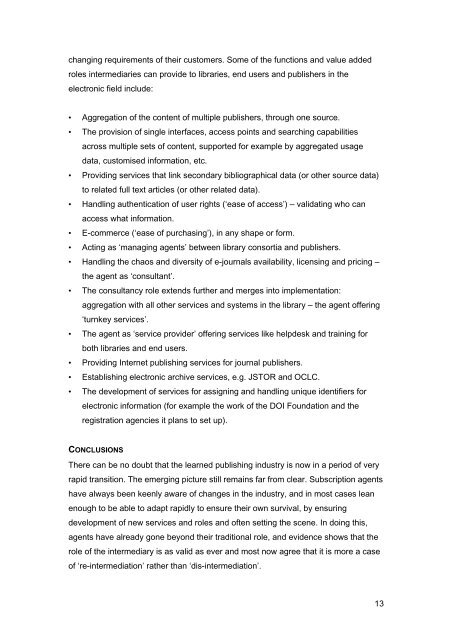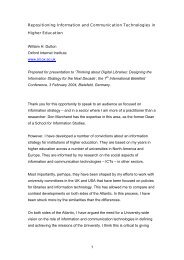PDF-document - 10th International Bielefeld Conference
PDF-document - 10th International Bielefeld Conference
PDF-document - 10th International Bielefeld Conference
Create successful ePaper yourself
Turn your PDF publications into a flip-book with our unique Google optimized e-Paper software.
changing requirements of their customers. Some of the functions and value addedroles intermediaries can provide to libraries, end users and publishers in theelectronic field include:• Aggregation of the content of multiple publishers, through one source.• The provision of single interfaces, access points and searching capabilitiesacross multiple sets of content, supported for example by aggregated usagedata, customised information, etc.• Providing services that link secondary bibliographical data (or other source data)to related full text articles (or other related data).• Handling authentication of user rights (‘ease of access’) – validating who canaccess what information.• E-commerce (‘ease of purchasing’), in any shape or form.• Acting as ‘managing agents’ between library consortia and publishers.• Handling the chaos and diversity of e-journals availability, licensing and pricing –the agent as ‘consultant’.• The consultancy role extends further and merges into implementation:aggregation with all other services and systems in the library – the agent offering‘turnkey services’.• The agent as ‘service provider’ offering services like helpdesk and training forboth libraries and end users.• Providing Internet publishing services for journal publishers.• Establishing electronic archive services, e.g. JSTOR and OCLC.• The development of services for assigning and handling unique identifiers forelectronic information (for example the work of the DOI Foundation and theregistration agencies it plans to set up).CONCLUSIONSThere can be no doubt that the learned publishing industry is now in a period of veryrapid transition. The emerging picture still remains far from clear. Subscription agentshave always been keenly aware of changes in the industry, and in most cases leanenough to be able to adapt rapidly to ensure their own survival, by ensuringdevelopment of new services and roles and often setting the scene. In doing this,agents have already gone beyond their traditional role, and evidence shows that therole of the intermediary is as valid as ever and most now agree that it is more a caseof ‘re-intermediation’ rather than ‘dis-intermediation’.13



